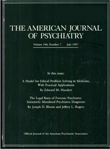Anorexia Nervosa: therapy and theory
Abstract
The reciprocal interaction between psychotherapy and theoretical assumptions is illustrated through observations of anorexia nervosa. Traditional psychoanalysis, with its emphasis on interpretation of unconscious processes, was found to be rather ineffective, whereas an approach evoking active participation on the part of the patient led to better treatment results. The experience of being listened to appeared to be of utmost importance. The characteristic deficits in self-concept and body awareness could be related to a paucity or an absence of confirming responses in the early mother-child interactions. This concept reinforced the focus on encouragement of initiative and autonomy during therapy.
Access content
To read the fulltext, please use one of the options below to sign in or purchase access.- Personal login
- Institutional Login
- Sign in via OpenAthens
- Register for access
-
Please login/register if you wish to pair your device and check access availability.
Not a subscriber?
PsychiatryOnline subscription options offer access to the DSM-5 library, books, journals, CME, and patient resources. This all-in-one virtual library provides psychiatrists and mental health professionals with key resources for diagnosis, treatment, research, and professional development.
Need more help? PsychiatryOnline Customer Service may be reached by emailing [email protected] or by calling 800-368-5777 (in the U.S.) or 703-907-7322 (outside the U.S.).



